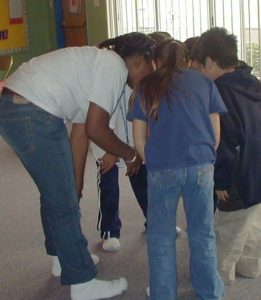 In Children’s Ministry it is our aim, our hope, our prayer, that the kids will internalize the truth of the Gospel.
In Children’s Ministry it is our aim, our hope, our prayer, that the kids will internalize the truth of the Gospel.
Children are concrete thinkers – they require substance (sight, sound, touch, smell, and emotions) to learn. Children need to experience a concept for them to understand it.
Reality Learning is a tool used in Sunday Plus Curriculum to help concrete thinking children gain an intuitive understanding of the abstract truth of the Gospel.
An excerpt from A Theology of Children’s Ministry, by Dr. Larry Richards:
“Cognitive research has shown that children do not think in terms of abstract verbal concepts that are learned as concepts and then applied to situations. Instead, children interact with their environment and from situations construct an understanding that then guides their responses. This response to situations is intuitive in nature: that is, the rational processes by which responses have been arrived at cannot be explained by children. But the responses of children are adaptive. Despite the fact that they cannot deal with cause and effect – that they do not think in terms of series of events linked through past and present into the future – children still do get along. And their understanding of life and how to respond does develop.”
Consider the following:
Elsa, a kindergartener, and her Mom went to visit Grammy. Upon entering the house Mom said, “Elsa, tell Grammy what the pump is in your body.”
Elsa replied, “My heart.”
“Elsa, tell Grammy what makes you breathe.” Mom prodded.
“My lungs,” Elsa proudly replied.
Grammy quickly asked, “Elsa what does it mean to breathe?”
“I don’t know,” came the hesitant answer.
Not to be outdone, Mom told Elsa to show Grammy what it meant to breathe. With that Elsa took two huge intakes of breath. To put into words what the concept “breathe” meant was too abstract. But Elsa did know what it meant to breathe because she had experienced breathing and thus had an intuitive understanding of the concept. The abstract concept “breathe” had become concrete to Elsa.
As a child matures, he gains more and more intuitive understanding of abstract concepts because he has had more and more experiences in life. Thus, a 2nd grader is going to be able to explain more than a 4 year old and a 7th grader is going to explain more than the 2nd grader.
One of the few passages in the Bible which instructs adults how to teach children is Deuteronomy 6:4-9. It is through living, through experiencing the realities of life, along with observing others model what it means to love the Lord God with all their heart, soul and might, that a child comes to understand the abstract truths of the Bible.
Children grow in their understanding of abstract concepts; not because they are able to mentally reason the concept, but because they have an INTUITIVE understanding due to the reality of experience.
If you are teaching the children about the Biblical truth of a “hardened heart,” the child is going to think of a physical heart that is hard. It is possible for the child to understand what a “hardened heart” is if she experiences her own hardened heart.
REAILITY LEARNING: the children are taken through an activity where, if the Holy Spirit so leads, the child will actually experience a “hardened heart.” For a sample, click Prodigal Sons a Reality Lesson.
The concept is understood not because of cognitive reasoning, but due to intuitive insight.
An important warning:
“Those who guide the theological development of children need to know that children can learn the technical verbal symbols of theology and use all of the proper terms and still not be able to apply or define those terms to everyday life.” A Theology for Children, William L. Hendricks, g 37
Reality Learning takes the children to another level of understanding the truths of Scripture. One Discipler will never forget the gasp of a sixth grader after having experienced this Reality Lesson: click Adam and Eve a Reality Lesson and then, in the midst of the Genesis 3 study, she stopped the study with a cry, “I’m Eve.”
When a truth is internalized it is difficult to ignore
and is much more apt to stick with the child forever.
KEY: when Reality Learning is used, the Discipler has no control over how the children will respond. The result is TOTALLY up to the Holy Spirit. Using Reality Learning demands that Disciplers cover their lessons in a lot of prayer.
Adults must be trained in how to lead a Reality Learning Lesson. It is more than just an activity. Disciplers must know what the children have to experience so the truth becomes concrete. When that happens the child has an intuitive understanding of the truth. Disciplers must be able to distinguish the difference between a Reality Learning Lesson and an Object Lesson.
Director’s Manual: Reality Learning (click here to go to box to download the Director’s Manual: Reality Learning)
Staff Manual: Reality Learning (click here to go to box to download the Staff Manual: Reality Learning)
Object Lesson’s Yes or No (click here to go to box to download a copy of Object Lesson’s Yes or No)